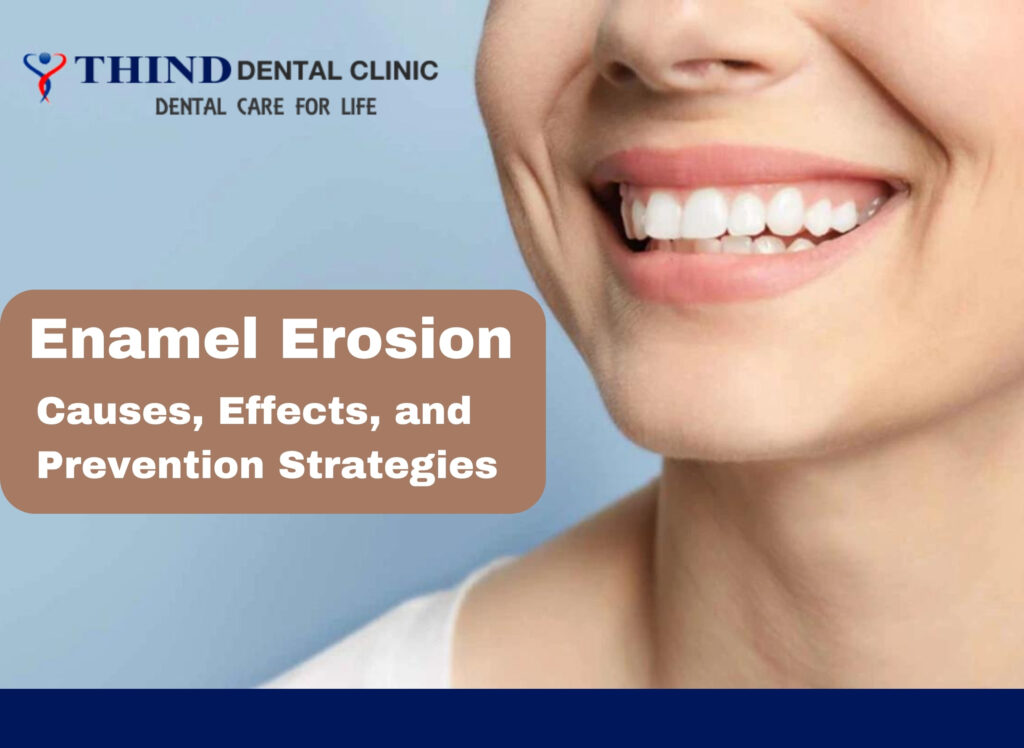Enamel erosion, although often overlooked, can significantly impact your dental health and overall well-being. Understanding its causes, effects, and prevention strategies is crucial for maintaining a healthy smile. At Thind Dental Clinic in Ludhiana, we prioritize educating our patients about enamel erosion to empower them to safeguard their dental health effectively.
Causes of Enamel Erosion:
Enamel erosion occurs when the protective layer of enamel on the surface of your teeth wears away over time. Enamel erosion can result from various factors, such as:
1. Acidic Foods and Beverages: Consuming acidic foods and beverages, such as citrus fruits, sodas, and sports drinks, can weaken enamel over time.
2. Acid Reflux: Gastroesophageal reflux disease (GERD) or frequent acid reflux episodes can expose your teeth to stomach acid, leading to enamel erosion.
3. Dry Mouth: Saliva plays a crucial role in neutralizing acids and protecting tooth enamel. Dry mouth conditions reduce saliva production, increasing the risk of enamel erosion.
4. Abrasive Toothbrushing: Using a hard-bristled toothbrush or brushing too vigorously can wear down enamel and contribute to erosion.
5. Bruxism: Habitual teeth grinding or clenching can put excessive pressure on enamel, accelerating erosion over time.
Effects of Enamel Erosion:
The effects of enamel erosion extend beyond cosmetic concerns and can impact your dental health in various ways:
1. Tooth Sensitivity: As enamel wears away, the underlying dentin becomes exposed, leading to increased tooth sensitivity to hot, cold, sweet, or acidic stimuli.
2. Tooth Discoloration: Enamel erosion can cause teeth to appear yellow or discolored as the darker underlying dentin becomes more visible.
3. Increased Risk of Cavities: Weakened enamel is more susceptible to decay, increasing the risk of cavities and dental infections.
4. Changes in Tooth Shape: Severe enamel erosion can alter the shape and appearance of teeth, affecting your smile’s aesthetics and functionality.
Prevention Strategies for Enamel Erosion:
Preventing enamel erosion involves adopting proactive dental care habits and making lifestyle changes to protect your teeth:
1. Limit Acidic Foods and Beverages: Acidic foods and beverages can weaken enamel over time, increasing the risk of erosion. To minimize this risk, it’s important to reduce your consumption of acidic items such as citrus fruits, vinegar-based dressings, sodas, and sports drinks. When consuming acidic foods or beverages, consider using a straw to minimize contact with your teeth, and rinse your mouth with water afterward to help neutralize acids and restore a healthy pH balance.
2. Maintain Good Oral Hygiene: Proper oral hygiene practices play a crucial role in protecting enamel from erosion and maintaining overall dental health. Brush your teeth gently using a soft-bristled toothbrush and fluoride toothpaste at least twice a day, focusing on all tooth surfaces and along the gumline. Be sure to use gentle, circular motions to avoid abrasive brushing that can contribute to enamel wear.
3. Stay Hydrated: Adequate hydration is essential for maintaining saliva production, which plays a vital role in protecting enamel and supporting overall oral health. Drink plenty of water throughout the day to keep your mouth moist and facilitate saliva flow, particularly after consuming acidic or sugary foods and beverages. Saliva helps neutralize acids, remineralize enamel, and wash away food particles and bacteria that can contribute to enamel erosion and decay.
4. Address Acid Reflux: Acid reflux, also known as gastroesophageal reflux disease (GERD), can significantly contribute to enamel erosion due to the acidic nature of stomach contents that reach the mouth. If you experience frequent acid reflux symptoms such as heartburn or regurgitation, it’s essential to consult your healthcare provider for proper diagnosis and treatment. Management strategies may include lifestyle modifications, dietary changes, and medications to reduce stomach acid production and alleviate symptoms.
5. Use Fluoride Products: Fluoride is a mineral known for its ability to strengthen enamel and make it more resistant to acid attacks and decay. Incorporating fluoride-containing mouthwash, toothpaste, or dental products into your oral hygiene routine can help fortify enamel and prevent erosion.
6. Wear a Nightguard: Bruxism, or teeth grinding, can exert excessive force on tooth surfaces, leading to enamel wear and erosion over time. If you grind your teeth, particularly during sleep, wearing a custom-fitted nightguard can help protect enamel from the damaging effects of bruxism. A nightguard is a dental appliance that fits over the teeth and provides a cushioning barrier to absorb the forces generated by grinding, preventing direct contact between the upper and lower teeth.
Conclusion
Enamel erosion is a common dental concern that can compromise your oral health if left unchecked. By understanding its causes, effects, and preventive measures, you can take proactive steps to safeguard your enamel and maintain a healthy, radiant smile. At Thind Dental Clinic in Ludhiana, we are committed to helping our patients preserve their dental health through comprehensive care and personalized treatment plans tailored to their unique needs. Schedule a consultation with our experienced dental team to learn more about protecting your smile from enamel erosion and other dental issues.
For additional information or to arrange an appointment with us
You can contact us at +91-92568-92568
or visit us at:
THIND DENTAL CLINIC
11-12-13-14 H.I.G Market, Opposite Water Tank, Ludhiana, Punjab 141010.
Also Read:
Single Sitting Procedure: Painless and Affordable Dental Care at Thind Dental Clinic
Dental Care for Children: Expert Tips for Parents on Caring for Your Child’s Teeth
Restoring Smiles: Painless Root Canal Treatment in Ludhiana
Transform Your Smile with Braces Treatment at Thind Dental Clinic

 Timings
Timings


